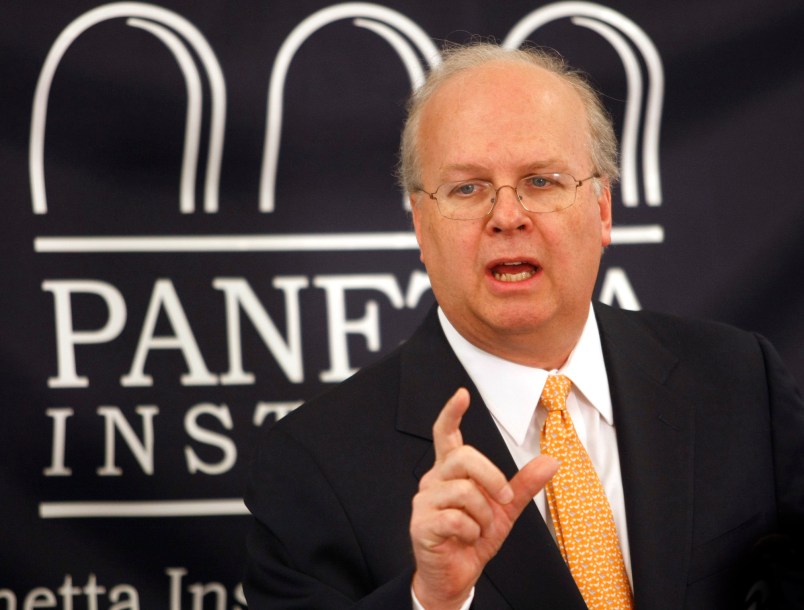With the rest of the political world gearing up for the 2012 elections, the Office of Special Counsel on Monday released a long overdue report that said that George W. Bush administration’s Office of Public Affairs in 2006 was essentially an extension of the Republican National Committee in the White House.
The report found that the Bush administration regularly broke the Hatch Act, which prohibits the use of federal tax dollars for political activities. The Office of Political Affairs in Bush’s White House, overseen by Karl Rove, dispatched cabinet officials to campaign for Republican candidates on the federal dime and forced federal political appointees to attend political meetings during work time, the report concluded.
Their efforts to propel the Republicans to electoral success wasn’t very successful — 2006 was the first year that Democrats took control of the House and Senate in decades. But the violations the investigation found (including 75 illegal political briefings by GOP appointees at top federal agencies from 2001 to 2007) demonstrated a “systematic misuse of federal resources,” according to the OSC.
The consequences for those violations? Nada. OSC has no teeth and is only capable of terminating employees — a sanction that became null-and-void when all the Bush administration left office. A spokesman said that the office had not made a formal referral to the Justice Department to ask it to pursue any possible charges.
By this point, broader recommendations included in the report intended to reform the Office of Political Affairs are also irrelevant. The Obama administration indicated last week they were restructuring their political operations and moving the political staff to the Democratic National Committee. That should help avoid any investigations by the Republican-led House Oversight Committee, whose new Chairman Darrell Issa (R-CA) wrote a letter to the OSC last summer asking why the report was taking so long. Issa had also requested investigations into allegations of Hatch Act violations during the Obama administration.
Still, it’s useful to walk through just how this investigation came about and what it found.
To start, OSC’s sordid legacy during the Bush administration could have a negative impact on the legitimacy of the report itself, at least in the eyes of those eager to dismiss it. After all, the investigation started under the reign of Scott Bloch, who headed the office until his resignation in 2008. He’s now awaiting sentencing for contempt of Congress for calling Geeks On Call to wipe his computer free of information being sought by Congress. (His sentencing was supposed to be today, but has been bumped back until Feb. 3, according to court records). Bloch didn’t respond to a request for comment.
Since Bloch’s resignation, the investigation — which was the result of a review of 100,000 pages of documents and interviews with 80 administration officials over the course of three years — has been overseen by an acting director, William E. Reukauf.
OSC’s investigation found that in some cases, briefings by the OPA for political appointees were mandatory and that attendance was recorded. An invitation to political appointees at the U.S. Department of Health and Human Services (HHS) read: “This meeting is mandatory. It will essentially be the same large meeting that we had last year about this time. So, please clear your schedule, put your pom-poms on, and let’s go!!!”
Not only were appointees encouraged to help in Republican races, White House liaisons at several agencies tracked appointees’ leave requests made for the purpose of working on campaigns.
As assistant to the chief of staff at the Peace Corps said she kept a spreadsheet showing the agency’s appointees and when and where they were volunteering. She said the OPA wanted to know the level of participation, and that she felt the OPA expected all appointees to volunteer.
White House liaisons said political briefings should “put the fear of God” in appointees so they’d sign up for 72-hour deployments around election time.
Some of the most egregious violations of the Hatch Act took place leading up the the 2006 midterm elections, when the report concluded OPA employees “methodically coordinated administration support to aid the campaigns of Republican candidates.”
One former OPA intern told investigators that OPA’s goal was, in sum, to “get Republicans elected.”
OPA rolled out an extensive plan to increase the traveling schedules of cabinet officials in the lead up to the 2006 elections. Surrogate Scheduler Mindy McLaughlin sent an e-mail to White House liaisons at federal agencies on Dec. 12, 2005 telling them that “This year and next promise to be very full of activity as we prepare for the midterm elections. In the coming months you will be receiving more and more requests for travel in targeted regions.”
The report concluded that when campaigns “contacted OPA to seek administration appointees to speak at their events — which, by itself, shows OPA’s cooperation with and support for political candidates — OPA used the target list to guide the allocation of assets and deploy appointees as speakers to best achieve Republican success in close races,” the report said. All of these activities constituted political activities under the Hatch Act.
Additional reporting by Melissa Jeltsen.









